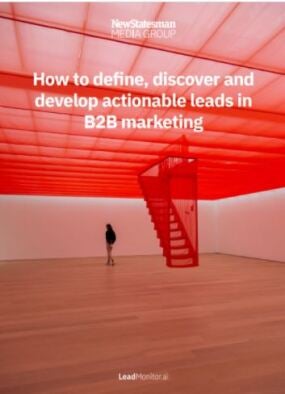
The latest in a series of articles produced by Press Gazette in association with marketing solution Lead Monitor looks at how to make your content marketing strategy work for a B2B audience.
Being a commercial content writer is a tough gig. The balance between producing engaging articles, offer an actionable takeaway and are of value to whoever reads them, and being up-front and honest that it is a paid-for advertorial is difficult.
Even then you still have a client or brand understandably keen to ensure their key messages stand out, and the platform you have access to with its own editorial guidelines and ethics.
In general, if your company or business chooses their marketing or advertising partners carefully, collaborating only with those they are comfortable with, it makes life easier for commercial writers as there should be more give and take in the crucial church/state relationship.
A lot of marketing content will be offered as part of a bigger campaign, and each will be marked up differently to ensure readers know it is advertorial (ironic since it is often referred to as ‘native’ to make it not stand out), but there are some general guidelines that should help every marketing content plan sing.
 Read New Statesman Media Group’s free white paper: How to define, discover and develop actionable leads in B2B marketing
Read New Statesman Media Group’s free white paper: How to define, discover and develop actionable leads in B2B marketing
Content planning with a client
Most effective commercial content will be a collaboration between brand objectives, the power of your platform and finding the right angle to sell a story in the most ‘editorial’ fashion.
Audiences don’t want to be directly sold to, or read a PR release – there is no reason for an advertorial not to be as entertaining, exciting or ground-breaking as its editorial cousin.
But a good client relationship remains at the heart of compiling a content plan, and never forget this campaign would not occur without their investment.
“Listen to what a client wants, and offer insights to support how your content plan chimes with what they are trying to achieve. Everything in the campaign should lead back to those insights,” David Leonard director of commercial product, Ryot Studios, Verizon Media.
Working with brands can be difficult, but content partnerships (be it written, podcasts, video or experiential) where said affiliation is open and proudly stated often produce the right results.
After all, PartnerPath confirms 68% of consumers can make buying decisions before speaking to sales representatives after seeing co-marketed campaigns – think Kanye & Adidas, BMW & Louis Vuitton or Burger King & McDonald’s.
[Read more: Lead generation tactics for marketers: The three biggest priorities]
General lessons for commercial content writing
In theory, commercial writers will possess all the storytelling skills available to any successful writer, but in reality, there are additional considerations, especially within B2B marketing.
When it comes to content directly relating to a service, product or achievement, provable accuracy trumps conjecture and opinion, which is why you will see so many statistics within marketing.
Marketing is designed to enhance experiences rather than disrupt, so rewarding the reader is a clear goal, be it with expert information or a previously unconsidered action.
It is your job to connect and link stories, so pointing people to third-party pieces or more within your canon allows your audience to explore the overall messaging, without leaving, never to be seen again.
Ultimately, every single piece of commercial content should be strong enough to be valuable on its own, found via SEO and enjoyed by someone who never expected to find it.
The most effective commercial content
For brave clients, allowing commercial content written about subjects that resonate with brand values but not mentioning the brand directly is key.
This allows you to deal with conversations and topics crucial to a client’s KPIs (and based on audience insights) without being overly commercial within the body of the content.
“Find your niche, angle or purpose. Ask your client: What makes you different from your competition?” Jackie Gallego, branded content editor.
Not all commercial content will be client-bought of course – B2B marketers will want to produce lots of material of their own, given its proven effectiveness.
The type of content is dependent on many factors, but it should always be designed to generate interest and leads.
The New Statesman Media Group recently asked senior marketers to rank the different formats of B2B marketing content in effectiveness, which should be the starting point for most planning.
Thought leadership, case studies and video occupied three of the top five spots. Here is how to get them right:
Thought leadership
Expertise matters – either have direct, hands-on experience of the topic, or prove an ongoing involvement by having consumed the latest trends and developments over many years
Ensure the content topic is well researched, discussed with others in the business and not well-trodden
If your topic IS well-trodden, ensure your angle is unique
Keep language conversational where possible – video works best for this
Think long term – an engaging thought leadership topic changes with time; can you follow this up by updating annually to create a loyal following?
Case studies
Always remember this is not your journey (although you are heavily involved) – this is the customer/client’s story
Try to follow the classic three-act structure – the set-up (client), confrontation (pain points) and resolution (campaign results)
Data and statistics are the cornerstone of B2B case studies; where possible, back up all big claims with numbers
There are many formats supportive of testimonials – infographics, audio and video should all be considered, the latter two are great for creating emotive, deeper content
Video
Keep video short (don’t get obsessed with the differing platforms – the ‘less-than-two-minute-rule’ is a great start). But consider where it appears in your overall content strategy – the earlier it appears, the shorter the video
As video is traditionally more expensive than the written version, consider keeping it evergreen, repurposing existing material and editing long-form into shorter chunks
Videos share the same values as all your marketing content – they need to be useful, relevant, timely, and professional
Be brave – don’t dismiss comedic, self-effacing content. If you do it right, people will remember the message
Email pged@pressgazette.co.uk to point out mistakes, provide story tips or send in a letter for publication on our "Letters Page" blog
